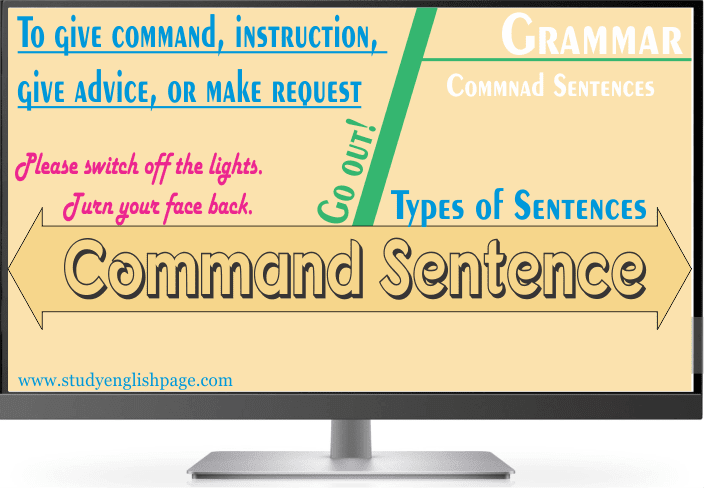What are command sentences
Command Sentences
Command sentence is a sentence that is used to give command, give instruction, make request, or give advice. More obviously, a command is used to tell someone to do something.
Who is someone? Someone is second person to whom a command is given. Something includes a piece of instructions, a piece of advice, a piece of authoritative directions, or an instance of asking.
- Go out.
- Handle with care these fragile things.
- Respect others and you will be respected.
- Give her two hundred dollars to buy something, please.
Form of Command Sentence
When we form a command sentence, we focus on three main elements that help in constructing a command sentence.
Elements of a Command Sentence
Implied Subject (You)
A command sentence looks as it does not have a subject. An implied subject (You) is there, but we don’t use. It is also called understood subject. Everyone knows what the subject of a command sentence is.
- Turn your face back.
This is a command sentence. It seems that there is no subject. In fact, there is a subject ‘you’. Command is always given to the second person, so we consider second person pronoun as a subject in commands. A command can be given to one or more than one. We use ‘you’ for both singular and plural.
When we diagram a command sentence, we use the understood subject ‘you’ in parenthesis.
- (You) turn your face back.
Sometimes, we use a direct title at the start of a command sentence. That title is not considered a subject.
- Kids, listen carefully.
We can write this sentence as kids, (you) listen carefully. It means subject is ‘you’, but not ‘kids’.
Imperative Verb
Command sentence begins with main verb or an infinitive form of verb without ‘to’. The verb is followed by the rest of predicate. Even a command sentence can be a single verb.
- Stop.
- Calculate all of these once again.
Punctuation Marks
A command sentence ends with full stop or exclamation mark. A command sentence with exclamation mark is used for emphasis.
- Come to class on time.
- Go, and never use my mobile again!
Negative Commands
We use negative command to tell someone not to do something. Negative commands begin with ‘do not’ or the shorter form ‘don’t’.
- Do not forget to do your homework.
- Don’t discuss your plan with everyone.
- Don’t drive fast when it rains.
Exceptional Cases
Sometimes, we use a subject in imperative sentence to make the subject clear.
- Ali sit down.
- One answer the phone.
- Everyone get ready.
We can use ‘you’ as a subject to show anger.
- You keep quiet!
- Don’t you talk to others!
We often use imperative form to make suggestion and express hope, but these are called unreal commands.
- Have a nice trip. (Hope)
- Bring blue pen if there is not a black pen. (Suggestion)
We can use ‘do’ before imperative sentence to make request, apologies, and complaints. They become more emphatic and polite.
- Do change your seat with me. (Request)
- Do forgive him. (Apology)
- Do keep the silence. (Complaint)
The words always, never, and ever are used before imperative sentences.
- Always remember my advices.
- Never tell a lie.
- Don’t ever tell a lie.
We sometimes use tag question after imperative sentence to emphasis.
- Lend me some money, will you?
- Write a letter yourself, can you?
Key Points Related to Command Sentences
Conditional Imperative
What is a conditional sentence? It is a sentence that shows a condition. It consists of one conditional clause. A command sentence is called a conditional command sentence when it has a conditional clause and command. In this case, a command is given under specific condition.
- If he does not attend the class, call me.
- When you reach you home, tell me by sending text message.
Softening Imperative Sentences
In written, writers with imperative sentences come across as bossy, even when they don’t want. This is because you can’t use tone of voice or body language to soften your request.
Imperative sentences can be softened by using some tricks. You can add the word ‘please’ to imperative sentence to make its tone more polite.
- Switch off the light.
- Please switch off the light. (Soften)
Another way to make imperative sentence soften is turning imperative sentence into question. The second sentence in the below examples is not an imperative sentence, but you can use it for the same purpose.
- Give her two hundred dollars.
- Could you please give her two hundred dollars?
Sometimes, you can add the reason for the command to soften.
- Don’t call me again.
- Don’t call me again; my mobile will be switched off, and I won’t forget your work.
Using of Reflexive Pronoun
As we know that ‘You’ the implied subject is used in imperative sentences. We don’t write the implied subject. When you need to use reflexive pronoun, you can use ‘yourself’ or ‘yourselves depending on the subject whether it is singular or plural.
- John, evaluate yourself before participating in games.
- Dear students, evaluate yourselves before participating in games.
EFFORTLESS ENGLISH COURSES
1/ PRONUNCIATION COURSE
Start Improving Your Pronunciation!
In this course, I promise to help you develop an American accent.
I AM EXCITED TO HELP YOU ACHIEVE THE HIGHEST LEVEL OF SUCCESS WITH YOUR ENGLISH SPEAKING! READ MORE
I WANT TO LEARN HOW TO SPEAK WITH AN AMERICAN ACCENT NOW!
JOIN NOW FOR ONLY $49.99
2/ Original English Course












0 Comments